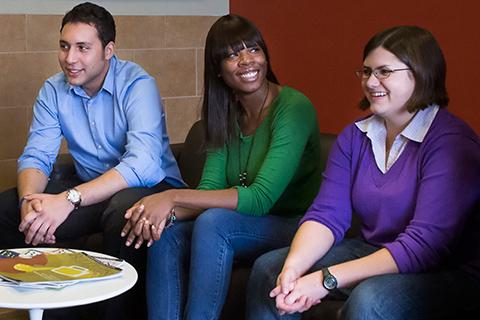Counseling Student Gives a Voice to Survivors of Military Sexual Assault

The U.S. Air Force sexual assault scandal continues to shock the nation, after reporting preliminary figures of 796 recorded sexual assault cases in 2012—a 30 percent increase from 2011. In response to this rising pandemic, the Air Force conducted several thousand interviews to inform the implementation of prevention programs. Not one of those interviews was with a victim.
Crystal Winfield ’13M, a student in Arcadia’s Master of Arts in Counseling Psychology program, is helping to give them a voice.
During her time as a undergraduate in the Reserve Officers’ Training Corps (ROTC) at University of New Mexico, Winfield personally knew someone who suffered sexual trauma during a deployment. Though the circumstances were unusual, she noticed there was a lot that could have been done to improve the patient outcome.
“That’s the problem,” she says. “Counselors don’t really know how to approach the military culture and don’t understand the stigma with reaching out for mental health assistance. If somebody really needs some help and they turn to somebody who really doesn’t understand what the culture is, then they are more likely to turn their backs on treatment.”
Many of the current services tend to target only one level of intervention. But individual therapy isn’t enough. “Interventions are needed that will build on existing advocacy efforts and therapy successes by combining the two in order to intercede on behalf of women veterans on multiple levels,” says Winfield.
Winfield understands the culture better than anyone. Though she was medically disqualified from serving, she completed three and a half years of ROTC, and her father served in the Air Force for 22 years. With a mind to protect a population she loves, she set out to find a school that offered a solid concentration in trauma counseling. After a national search, she found Arcadia had the most established trauma concentration.
“When it came to grad school, I was looking for a change,” says Winfield. “I graduated with several thousand people and only two of my major courses had less than 100 registered students.”
During her first few weeks at Arcadia, she was surprised by the friendly, responsive staff. “When you reach out to people for financial aid or advising, they answer you and fix your problem instead of just telling you to show up for an appointment in two weeks to speak with a representative.”
Her experience was consistent from scheduling to the classroom. Professors know her name as well as her interests. In fact, in her first year, she was approached by former Arcadia instructor Dr. Maren Wesphal, who noticed her interest and aptitude for military trauma counseling. Together, they recognized the absence of literature on the cultural effects of the military and began to conduct research on female veterans and military sexual trauma.
From fall 2011 to spring 2012, Winfield conducted a needs-based assessment by gathering existing literature and interviewing representatives from local advocacy agencies such as Service Women’s Action Network. Winfield also interviewed her friend who experienced sexual trauma. She tweaked her friend’s case to protect her confidentiality and talked with her about the ways in which a counselor could have approached her complicated situation.
Winfield presented her research and recommendations at the 2012 Diversity Challenge in Boston, Mass., on Oct. 20, 2012. She arrived with a presentation and plan, but after assessing the audience’s knowledge of the military population, she realized she needed to restructure her talk to make a greater impact.
“My presentation was focused on the scope of the problem, and then I was going to present recommendations for counseling that population based on what was in the literature. But as I listened to [the first speaker], I thought, ‘I don’t know if this is going to land well with the audience.’ So I began my presentation by asking the room who knew about the military or had had close contact with them. Out of the 30 people in the room, maybe two raised their hands.”
With only 20 minutes left she sought to generate awareness for a population that she calls family. By focusing on her friend’s case, Winfield explained how it played out under normal circumstances and all the areas in which mental health professionals could have helped to improve the patient outcome.
Winfield was approached by several in attendance afterward. “It was really well received,” she says.
She hopes to continue her advocacy and research to help survivors like her friend. “It’s great being in a grad school where you are taken seriously. I’m recognized as an expert because I am an expert. ”
Winfield is a member of Psi-Chi-Honors Society for Psychology and the 2012 Pennsylvania Counseling Association’s Graduate Student of the Year. She is currently interning at the Intensive Outpatient Program at the Lansdale office in Montgomery County.


